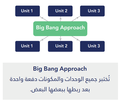| This article needs additional citations for verification. Please help improve this article by adding citations to reliable sources. Unsourced material may be challenged and removed. Find sources: "Integration testing" – news · newspapers · books · scholar · JSTOR (August 2010) (Learn how and when to remove this message) |
| Part of a series on |
| Software development |
|---|
| Core activities |
| Paradigms and models |
| Methodologies and frameworks |
| Supporting disciplines |
| Practices |
| Tools |
| Standards and bodies of knowledge |
| Glossaries |
| Outlines |
Integration testing, also called integration and testing, abbreviated I&T, is a form of software testing in which multiple parts of a software system are tested as a group.
Integration testing describes tests that are run at the integration-level to contrast testing at the unit or system level.
Often, integration testing is conducted to evaluate the compliance of a component with functional requirements.
In a structured development process, integration testing takes as its input modules that have been unit tested, groups them in larger aggregates, applies tests defined in an integration test plan, and delivers as output test results as a step leading to system testing.
Approach
Some different types of integration testing are big-bang, mixed (sandwich), risky-hardest, top-down, and bottom-up. Other Integration Patterns are: collaboration integration, backbone integration, layer integration, client-server integration, distributed services integration and high-frequency integration.
In big-bang testing, most of the developed modules are coupled together to form a complete software system or major part of the system and then used for integration testing. This method is very effective for saving time in the integration testing process . However, if the test cases and their results are not recorded properly, the entire integration process will be more complicated and may prevent the testing team from achieving the goal of integration testing.
In bottom-up testing, the lowest level components are tested first, and are then used to facilitate the testing of higher level components. The process is repeated until the component at the top of the hierarchy is tested. All the bottom or low-level modules, procedures or functions are integrated and then tested. After the integration testing of lower level integrated modules, the next level of modules will be formed and can be used for integration testing. This approach is helpful only when all or most of the modules of the same development level are ready. This method also helps to determine the levels of software developed and makes it easier to report testing progress in the form of a percentage.
In top-down testing, the top integrated modules are tested first and the branch of the module is tested step by step until the end of the related module.
Sandwich testing combines top-down testing with bottom up testing. One limitation to this sort of testing is that any conditions not stated in specified integration tests, outside of the confirmation of the execution of design items, will generally not be tested.
See also
References
- ISO/IEC/IEEE International Standard - Systems and software engineering. ISO/IEC/IEEE 24765:2010(E). 2010. pp. vol., no., pp.1–418, 15 Dec. 2010.
- Martyn A Ould & Charles Unwin (ed), Testing in Software Development, BCS (1986), p71. Accessed 31 Oct 2014
- Binder, Robert V.: Testing Object-Oriented Systems: Models, Patterns, and Tools. Addison Wesley 1999. ISBN 0-201-80938-9



